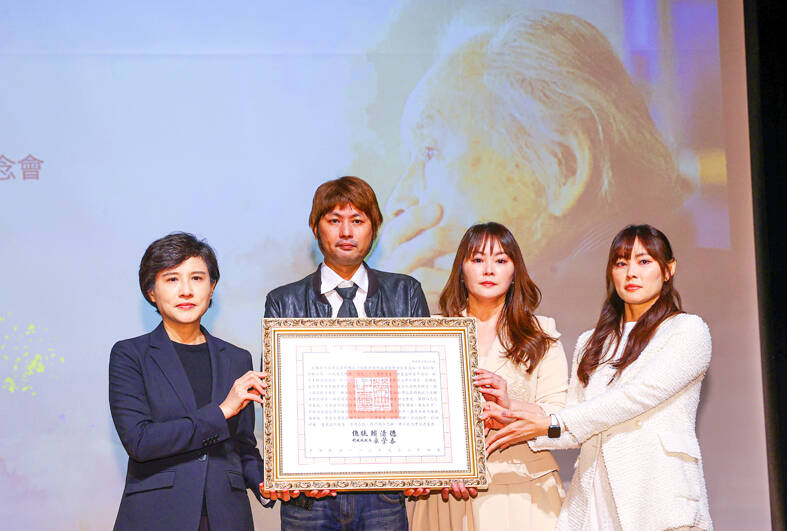White Terror victim and human rights campaigner Tsai Kuan-yu (蔡寬裕) was on Saturday posthumously awarded a presidential citation in recognition of his contributions toward promoting human rights and transitional justice.
At a memorial in New Taipei City, Tsai’s three children accepted the citation from Vice Premier Cheng Li-chiun (鄭麗君).
Tsai “devoted himself to defending the values of freedom and human rights throughout his life” and served as an “exemplar,” the citation said.

Photo: CNA
It also commended him for his involvement in the introduction of the Act on Promoting Transitional Justice (促進轉型正義條例) in 2017 and the establishment of the National Human Rights Museum a year later.
His efforts paved the way for more government efforts to expose state wrongdoings during the White Terror era — a period of political repression by the-then Chinese Nationalist Party (KMT) regime from 1947 to 1987 — and compensate those harmed.
Minister of Culture Li Yuan (李遠) highlighted Tsai’s legacy and said his ministry would continue transitional justice initiatives.
Born in Taipei on Feb. 5, 1933, Tsai was imprisoned twice for a total of 13 years in the 1950s and 1960s.
He was first targeted by the authorities in 1957 and detained for about six months after being accused of inciting his classmates to strike in protest of the government’s handling of the killing of a Taiwanese by a US military officer, which was later known as the “Liu Tzu-jan (劉自然) incident” or the “May 24 incident.”
In 1962, while teaching at and managing an institute providing after-school classes, Tsai was arrested for his suspected involvement in pro-Taiwanese independence activities.
That time, he was sentenced to 10 years in prison.
He was initially imprisoned in New Taipei City, but was later transferred to Taitung County, where he became embroiled in an attempt by a group of activists outside the prison to occupy the facility by force.
Tsai agreed to help open the prison gate for the group, but the government stopped the plan before he could take any action. As a result, Tsai received an additional three years in jail.
After he was released in May 1975, he launched a shoe manufacturing business in Taichung with his friends.
He began calling for government redress for political prisoners after the lifting of Martial Law in 1987.
In his later years, he volunteered at the National Human Rights Museum, where he regularly gave lectures and guided tours.
Tsai died in early September at the age of 91.
Shortly after his passing, President William Lai (賴清德) offered his condolences to Tsai’s family and said the late activist’s “unwavering dedication to the work of transitional justice” would be remembered, a statement issued by the Presidential Office said.

A year-long renovation of Taipei’s Bangka Park (艋舺公園) began yesterday, as city workers fenced off the site and cleared out belongings left by homeless residents who had been living there. Despite protests from displaced residents, a city official defended the government’s relocation efforts, saying transitional housing has been offered. The renovation of the park in Taipei’s Wanhua District (萬華), near Longshan Temple (龍山寺), began at 9am yesterday, as about 20 homeless people packed their belongings and left after being asked to move by city personnel. Among them was a 90-year-old woman surnamed Wang (王), who last week said that she had no plans

China might accelerate its strategic actions toward Taiwan, the South China Sea and across the first island chain, after the US officially entered a military conflict with Iran, as Beijing would perceive Washington as incapable of fighting a two-front war, a military expert said yesterday. The US’ ongoing conflict with Iran is not merely an act of retaliation or a “delaying tactic,” but a strategic military campaign aimed at dismantling Tehran’s nuclear capabilities and reshaping the regional order in the Middle East, said National Defense University distinguished adjunct lecturer Holmes Liao (廖宏祥), former McDonnell Douglas Aerospace representative in Taiwan. If

TO BE APPEALED: The environment ministry said coal reduction goals had to be reached within two months, which was against the principle of legitimate expectation The Taipei High Administrative Court on Thursday ruled in favor of the Taichung Environmental Protection Bureau in its administrative litigation against the Ministry of Environment for the rescission of a NT$18 million fine (US$609,570) imposed by the bureau on the Taichung Power Plant in 2019 for alleged excess coal power generation. The bureau in November 2019 revised what it said was a “slip of the pen” in the text of the operating permit granted to the plant — which is run by Taiwan Power Co (Taipower) — in October 2017. The permit originally read: “reduce coal use by 40 percent from Jan.

‘SPEY’ REACTION: Beijing said its Eastern Theater Command ‘organized troops to monitor and guard the entire process’ of a Taiwan Strait transit China sent 74 warplanes toward Taiwan between late Thursday and early yesterday, 61 of which crossed the median line in the Taiwan Strait. It was not clear why so many planes were scrambled, said the Ministry of National Defense, which tabulated the flights. The aircraft were sent in two separate tranches, the ministry said. The Ministry of Foreign Affairs on Thursday “confirmed and welcomed” a transit by the British Royal Navy’s HMS Spey, a River-class offshore patrol vessel, through the Taiwan Strait a day earlier. The ship’s transit “once again [reaffirmed the Strait’s] status as international waters,” the foreign ministry said. “Such transits by